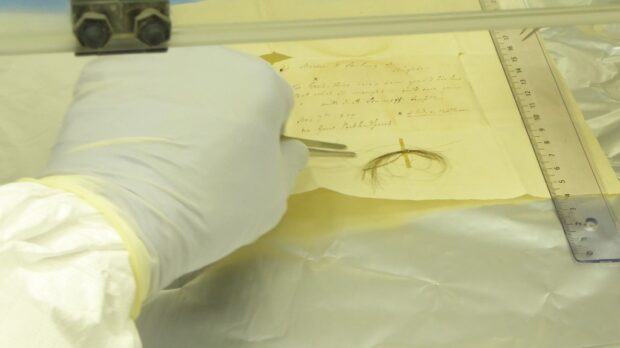DNA analysis of Beethoven’s hair shows liver failure likely cause of his death

This undated image shows the Stumpff Lock of hair from German composer Ludwig van Beethoven in a laboratory at the Max Planck Institute for the Science of Human History, in Jena, Germany. Beethoven died in Vienna nearly 200 years ago. Ever since, biographers have sought to explain the causes of the German composer’s death at the age of 56, his progressive hearing loss and his well-documented struggles with chronic illness. A team of researchers who sequenced Beethoven’s genome using locks of his hair may now have some answers. Liver failure, or cirrhosis, was the possible cause of Beethoven’s death brought about by a number of factors including the composer’s alcohol consumption, they said. ANTHI TILIAKOU / Max Planck Institute for the Science of Human History / AFP
WASHINGTON, United States—Ludwig van Beethoven died in Vienna nearly 200 years ago after a lifetime of composing some of the most influential works in classical music.
Ever since, biographers have sought to explain the causes of the German composer’s death at the age of 56, his progressive hearing loss and his struggles with chronic illness.
An international team of researchers who sequenced Beethoven’s genome using authenticated locks of his hair may now have some answers.
Liver failure, or cirrhosis, was the likely cause of Beethoven’s death brought about by a number of factors including his alcohol consumption, they said.
“We looked at possible genetic causes of his three main symptom complexes—the progressive hearing loss, the gastrointestinal symptoms and the liver disease ultimately leading to his death due to liver failure,” said Markus Nothen of the Institute of Human Genetics at the University Hospital of Bonn, one of the co-authors.
Article continues after this advertisementBeethoven, Nothen said, had “a strong genetic disposition to liver disease” and sequences of the hepatitis B virus were detected in his hair.
Article continues after this advertisement“We believe the disease arose from an interplay of genetic disposition, well documented chronic alcohol consumption and hepatitis B infection,” Nothen said.
No explanation for deafness
Johannes Krause of the Max Planck Institute for Evolutionary Anthropology said hepatitis B “was probably quite common at that time in the early 19th century.”
“At least in the last few months before his death he was infected with hepatitis B virus,” Krause said.
The authors of the study, published in the Cell Press journal Current Biology on Wednesday, March 22, were unable to determine any genetic causes for the progressive hearing loss that eventually left Beethoven completely deaf by 1818.
The researchers analyzed eight locks of hair said to be from Beethoven and determined that five of them were “almost certainly authentic,” said Tristan Begg, a PhD student at the University of Cambridge and the lead author of the study.
“Because we reconstructed the genome from ultra-short DNA fragments, we only confidently mapped about two-thirds of it,” he said.
One of the most-famous strands of hair, known as the “Hiller Lock,” which has been the subject of previous research and found to contain high levels of lead, was revealed not to be from Beethoven at all but from a woman.
Family secret
Beethoven, who was born in Bonn in 1770 and died in 1827, battled gastrointestinal problems at various times of his life as well as jaundice.
“There were periods of acute illness where he was unable to work, for example, his month-long period of acute illness in the spring of 1825,” Begg said.
The researchers, by studying Beethoven’s DNA data and archival documents, also uncovered a discrepancy in his legal and biological genealogy.
They found an “extra-pair paternity event”—a child resulting from an extramarital relationship—in Beethoven’s direct paternal line, said Toomas Kivisild of the Institute of Genomics at the University of Tartu.
Kivisild said it occurred sometime within seven generations that separate a common ancestor, Aert van Beethoven, at the end of the 16th century and Beethoven’s birth in 1770.
Begg said it was no surprise it was not recorded.
“You wouldn’t necessarily expect an extra-pair paternity event to be documented,” he said, it being “probably clandestine in nature.”
“You cannot rule out that Beethoven himself may have been illegitimate,” Begg said.
“I’m not advocating that,” he stressed. “I’m simply saying that’s a possibility and you have to consider it.”
Beethoven had asked in an 1802 letter to his brothers that his health problems, particularly his hearing loss, be described after his death.
“He had the wish to be studied post-mortem,” Krause said.
“And it is kind of, basically, his wish that we are fulfilling to some degree with this project.” /ra
RELATED STORIES:
Germany celebrates 250-year-old ‘pop star’ Beethoven
Unfinished Beethoven piece reimagined in a click
WATCH: Dawn Zulueta plays Beethoven’s ‘Moonlight Sonata’ in first public performance